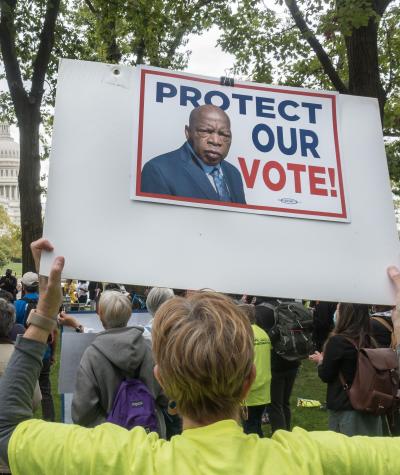The 2024 election cycle may be one of the most contentious ever, which is why it is imperative that voters feel confident in the health and security of our democracy. Congress can help realize this goal by passing the reintroduced Freedom to Vote Act as soon as possible.
The Freedom to Vote Act is a transformative proposal that would increase Americans’ access to the ballot box, neutralize partisan and racial gerrymandering and increase transparency in our campaign finance system to counteract the impact of secret spending in our elections. If enacted, it would provide clear, national standards that ensure every voter can make their voice heard.
The Freedom to Vote Act will broadly advance three main goals.
Securing our Democracy
In the past two years, the threat of politically motivated violence against election workers has soared. As of March 2022, nearly one in three local election officials know at least one election worker who has left the job, partly due to safety concerns, increased threats or intimidation.
Election workers — the everyday Americans who belong to both parties and undergo training to familiarize themselves with electoral processes, rules and laws — are an important part of our democracy’s infrastructure. Our elections can’t run without them, so it is vital that Congress act now to protect them.
The Freedom to Vote Act would address these threats by strengthening protections for election workers against intimidation, threats, coercion or interference, including for those involved with counting, canvassing or certifying election results.
This essential legislation would also fortify our democracy by enhancing voting system security, promoting voter-verifiable paper ballots, and requiring post-election audits that can facilitate public confidence in electoral outcomes.
Making Elections More Accessible and Equitable
Across the board, the Freedom to Vote Act will help make our democracy more accessible and representative for all. To start, the bill makes safe, convenient voting options like vote by mail, early voting and drop boxes accessible to every American. Data shows these measures increase voter turnout, which strengthens our democracy by bringing more voters into it.
Election Day should be a day of pride and civic engagement. The Freedom to Vote Act honors this ideal by making Election Day a national holiday, so more voters can make their voice heard in our democracy.
The bill also bans partisan gerrymandering, which will prevent politicians from being able to manipulate voting maps and choose their own voters, as well as provides stronger protections against racial vote dilution in redistricting.
These measures will help to ensure that Black and brown voters who have been historically marginalized have an equal voice in our democracy.
Because wealthy special interests use unlimited, secret money to rig the political system in their favor, it is equally important that voters are given the opportunity to elect a candidate who best represents their interests—not simply the candidate backed by the most money.
The Freedom to Vote Act would establish a voluntary “small donor financing” program for House candidates that would amplify the voices of average Americans, as well as candidates who may be more representative of their constituents and un able to run otherwise.
Improving Transparency
Enhancing transparency is a major component of the Freedom to Vote Act, which it would achieve by reforming both our campaign finance and redistricting practices.
Several major campaign finance reforms are incorporated into the Freedom to Vote Act, including legislation that would reduce secret spending in our elections by tracing big political donations back to their true source, eliminating loopholes in public reporting requirements, and requiring greater disclosure from “dark money” groups.
It also contains a proposal that would increase transparency around digital political advertisements, in order to prevent foreign interference in our elections through such advertisements.
Passing the Freedom to Vote Act would push back against dark money in our elections and help fulfill voters’ fundamental right to know who is spending money to influence their vote.
The Freedom to Vote Act would also promote transparency in the redistricting process by requirings states to publish their proposed maps, and the data they used to create them, for the public free of cost.
Currently, self-interested politicians control the redistricting process in dozens of states, and they can use that power to gerrymander voting maps to pick their own voters. The Freedom to Vote Act would work to promote greater public participation in redistricting, which is a step forward that would grant millions of Americans a more equal voice in our democracy.
It is important to note that an opposing anti-democracy bill, the American Confidence in Elections Act (ACE Act), was introduced in the House of Representatives last week. Despite the misleading name, the ACE Act is bad for voters.
Rather than make our elections more secure, transparent and accessible, the ACE Act erodes access to the ballot box, opens the door for wealthy donors to influence elections, imposes new burdens on nonpartisan election workers, restricts the franchise for voters in Washington, DC, and much more.
The Freedom to Vote Act, in deep contrast, is legislation that offers comprehensive advances to our democracy and addresses the most pressing challenges to our electoral process – the true recipe for voter confidence and trust.
The three broad goals of the Freedom to Vote Act have long had bipartisan support, and they are critical to the wellbeing of democracy across the country—not just in red or blue states. Congress must enact the Freedom to Vote Act swiftly to ensure that the 2024 election is free and fair, and to help secure the ultimate promise of a democracy that works for all.
